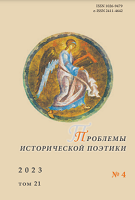Термин μῦθοϛ в русских переводах «Поэтики» Аристотеля XIX века
The Term Mῦθοϛ in 19th Century Russian Translations of Aristotle’s “Poetics”
Author(s): Anna Yurievna NilovaSubject(s): Russian Literature, 19th Century, Translation Studies, Theory of Literature
Published by: Петрозаводский государственный университет
Keywords: Aristotle; Poetics; terminology; literary criticism; μῦθοϛ; myth; fabula; plot; fiction; verisimilitude; imitation; translation;
Summary/Abstract: Aristotle’s “Poetics” had a decisive influence on the subsequent development of European literary theory. Translation and interpretation of its thesaurus still remains one of the most difficult literary problems due to the depth and capacity of the terms and the complexity of the conceptual apparatus. The term μῦθοϛ was translated into Latin as fabula and in this translation entered the terminology of European literary criticism. However, such a translation does not fully convey the meaning of the term. In addition, the assignment of the meaning of an implausible narrative to the term “fabula” in Latin rhetoric, adopted by the medieval rhetorical tradition, completely distorts the Aristotelian understanding of not only myth, but also mimesis. Russian classicist poets adopted the European tradition of rendering the term μῦθοϛ as a plot, but 19th-century theorists and translators began to look for new equivalents to convey this term. N. F. Ostolopov uses the term “fable”, which turns out to be unsuccessful due to its ambiguity and the presence of an evaluative meaning. S. P. Shevyrev conveys μῦθοϛ as a myth and shows that such an interpretation adequately conveys the depth of the Aristotelian term. However, his experience was eagerly used by the translators of Poetics. B. I. Ordynsky in his translation uses the term “fiction,” which conveys the content of the term μῦθοϛ more adequately than fabula, but does not take into account all the shades of its meaning. V. I. Zakharov renders the term μῦθοϛ as plot and myth, but their use in translation is not regulated. V. G. Appelrot, like V. I. Zakharov, uses two terms to convey Aristotle’s term - myth and plot, but Appelrot’s use of them is more consistent. In cases where Aristotle talks about myth as a common cultural property, Appelroth uses the term “myth,” and in those cases when Aristotle talks about the individual author’s interpretation of a common cultural heritage or an original structural-narrative complex, he uses the term “fabula.” The research conducted by 19th-century theorists and translators demonstrated the complexity of Aristotle’s term and prepared discussions about conveying its meaning in the 20th century.
Journal: Проблемы исторической поэтики
- Issue Year: 21/2023
- Issue No: 4
- Page Range: 9-24
- Page Count: 16
- Language: Russian

